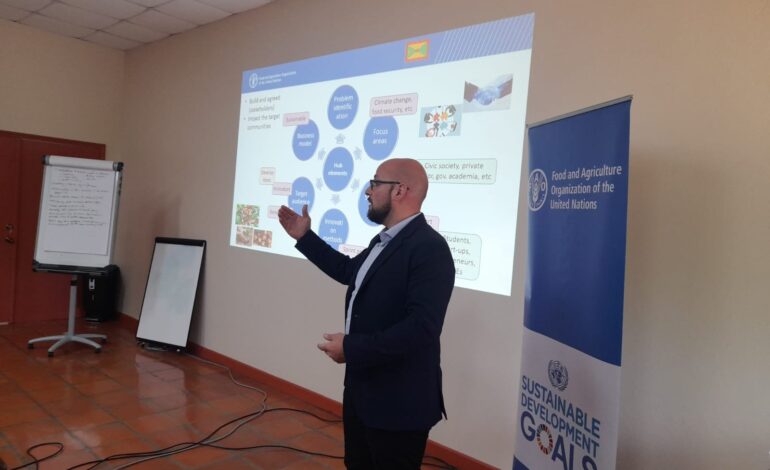
Grenada looks to digital agriculture and innovation for an improved agriculture sector
Grenada’s agriculture sector stands to benefit from digital agriculture and innovation initiatives to strengthen the country’s agri-food systems.
28 March, 2023 – Bridgetown, Barbados – The Food and Agriculture Organization of the United Nations (FAO) and The Ministry of Agriculture and Lands, Fisheries and Cooperatives jointly launched two projects to promote digital agriculture and resilient agri-food systems in Grenada, on March 22, 2023.
The Global Network of Digital Agriculture Innovation Hubs (DAIH) and the Regional E-Agriculture (REA) for the Caribbean, a post COVID–19 mechanism to promote resilient agri-food, were both launched during an Inception and Workplan Validation Workshop held for both projects, from March 22 to March 24, 2023.
The workshop was attended by thirty-five key stakeholders including farmers, government officials, extension officers, and the private sector, with the aim of obtaining an integrated view of project objectives, linkages and expected benefits.
The projects aims to support current initiatives being implemented by the Ministry of Agriculture and Lands, Fisheries and Cooperatives with FAO’s technical support and to strengthen the enabling environment for the adoption of digital agriculture strategies at the national level. They will also establish a national digital agriculture innovation hub and programme to accelerate the development and uptake of digital innovations that support farmers and other value chain actors, especially youth and women, to become more competitive. Both projects will use innovation as a tool in driving public-private partnerships, resulting in resources being leveraged to maximize impact and strengthen the engagement and commitment of all stakeholders.
The DAIH project will support the Ministry of Agriculture and Lands, Fisheries and Cooperatives in establishing a digital transformation strategy, starting with an intervention to respond to gaps in digital agriculture. The Innovation Hub will create a space where different agricultural connections can be made between various stakeholders in agriculture, such as linking farmers with extension officers. This may include a marketing app or a farmer’s registration portal which would strengthen the services offered by the Ministry of Agriculture and Lands, Fisheries and Cooperatives.
The REA is a regional project benefitting six countries, including The Bahamas, Belize, Dominica, Grenada, Guyana and St, Kitts and Nevis. The focus of the REA in Grenada is the establishment of a drone mapping and Geographic Information System (GIS) team in the Ministry of Agriculture and Lands, Fisheries and Cooperatives. This will allow them to better utilize agriculture data collection and planning techniques and to acquire updated spatial information for the farming population. The updated information will also enable the Ministry of Agriculture and Lands, Fisheries and Cooperatives to respond more effectively to affected farming communities when managing systemic post multi-hazards risks such as flooding.
Aaron Francois, Permanent Secretary in the Ministry of Agriculture and Lands, Fisheries and Cooperatives spoke about the digital tools, and stated, “As you know there are serious challenges that are facing the agricultural sector and we know some of them very well. They include low product quality, high input prices, lack of information on best practices, lack of market information for informed decision-making, high incidence of praedial larceny. We have included a component to address praedial larceny using digital technology. We believe it can help in a significant way to help curb the incidence of high praedial larceny in Grenada. We are confident that the incorporation of digital technology in the agricultural sector will help in its transformation,” Francois said.
Nikola Trendov, FAO’s Digital Agriculture and Innovation Specialist, explained that digitalization in agrifood systems brings several opportunities. He highlighted, “The new generations are already a digital native and equipping them with these tools can improve food security and help persons to be more resilient to the impacts of climate change. He concluded that those are things that we cannot avoid but we must put in place now”.
Meanwhile, Kenton Fletcher, Focal Point for the Project and Computer Systems Administrator in the Ministry of Agriculture and Lands, Fisheries and Cooperatives indicated that, “We need to bring in Information and communication technologies to improve production, to improve marketing and also have innovative ideas on how we can help farmers do better record keeping, better management of their farms. These are the issues we are trying to target”. He noted that the FAO projects would support these areas.
Vermaran Extavour, FAO Project Coordinator indicated that the initiatives will provide Grenada with a strategy for transforming the sector digitally, while piloting the use of emerging solutions in the agriculture sector. She noted that, “Addressing digital literacy among farmers and helping them to identify and use digital solutions in their farm businesses are important objectives for this project. We want to see those persons actively using a digital tool to connect, to access market information, to access weather data that is relevant for planting and making more informed decisions”.





